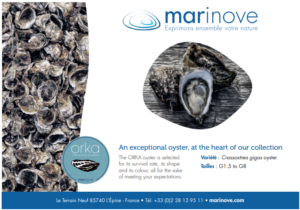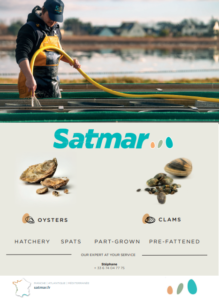Future proof
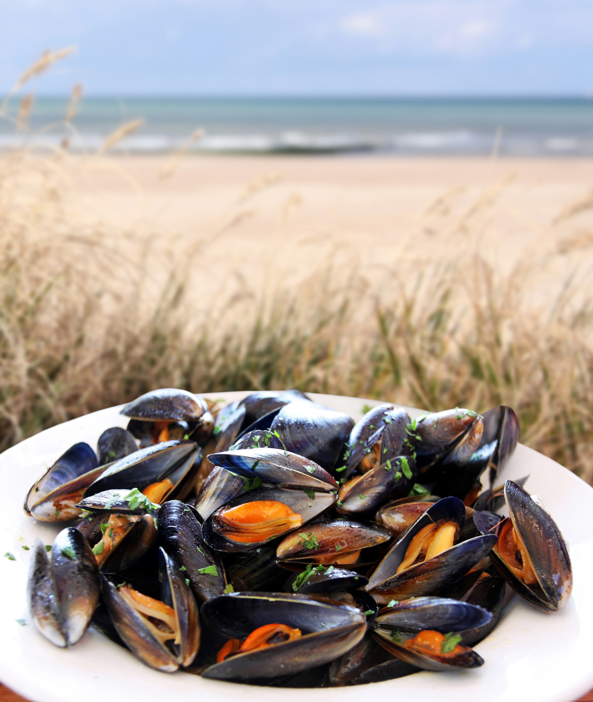
The eighth international Shellfish Conference, held in the Netherlands, covered some key topics for the industry, as Nicki Holmyard reports
Future-proofing shellfish culture in the Netherlands was the subject of the eighth international Shellfish Conference in January in Deltapark Neeltje Jans, a theme park and nature reserve on the Eastern Scheldt. Shellfish farmers from all over the world attended the conference, including delegations from England, the Shetland Isles, France, Portugal, Spain, Turkey and New Zealand.
Over two days, several hundred delegates took in 18 plenary sessions, which looked at opportunities for mussels and oysters in a sustainable and protein-rich diet. Speakers looked at: where shellfish could be produced in future, given lessons learned from current practices; what new techniques and technology are available to a sector that has traditionally relied on fished mussel seed and on-bottom grow-out methods; seed supply; policy and regulation; issues such as unexplained mortalities; the way in which shellfish farming fits in with nature conservation; and oceanographic and ecological impacts.

Cécile Fouquet (left); Tilly Sintnicolaas (right)
Cécile Fouquet from the Aquaculture Advisory Council (AAC) spoke about the work her organisation undertakes to research, discuss, prepare and submit recommendations and suggestions to the EU Commission and member states. Issues relate to the management, socio-economic and conservation aspects of aquaculture. Recent recommendations include the need for aquaculture policy reform, promoting the involvement of young professionals in aquaculture, encouraging good husbandry practices in shellfish farming, the risks of emerging bivalve mollusc pathogens in connection with climate change, using shellfish farming as a nitrogen sink and carbon sequestration by molluscs.
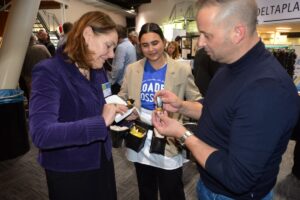
loaded mussels with lord mayor Jose van Egmond and mussel farmer Jos Steketee
Prizewinning bites
Tilly Sintnicolaas and Dana Nijstad from the Dutch Mosselbureau shared their insights on the fast food generation market for mussels and the work that has been undertaken over the past year or so to develop new products such as mussel bites, which were served at the conference reception.
Produced by Superfood Zeeland as part of the company’s sea-based food products, the mussel bites also won the conference innovation prize. I can report that they tasted delicious.
It is universally acknowledged that shellfish are a source of sustainably farmed proteins and healthy fatty acids. As such, they can play an essential role in the transition to eating less or more responsibly produced meat. However, considerable work is needed to change the Dutch consumer mindset that associates shellfish with conviviality and summer atmospheres, and as a fresh product.
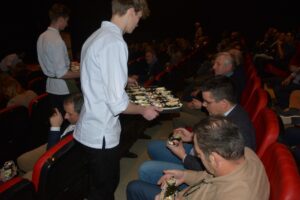
Codium oysters
Also available for delegates to taste were two oysters specially prepared by Wouter Kik, chef patron of Michelin-starred restaurant Codium in Goes. I love oysters but his preparations took my taste buds into a new realm!
Delegates heard that traditional Dutch mussel production has been declining for many years, mainly due to a lack of sufficient cultivation space, as more seed areas have been given over to nature. Trials are being conducted to collect both mussel and oyster spat in floating systems in the North Sea, and also to ongrow mussels at sea. However, it is still uncertain whether it is technically or economically feasible to scale up, despite evidence from other areas of the world where the concept has been proven.
Innovation is also underway in terms of new harvesting techniques and low-emission vessels.
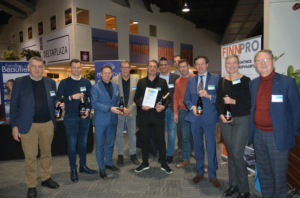
Innovation prize winner Rem van de Bosch of Superfood Zeeland (centre) with members of the jury
Shellfish health
Two presentations on mussel mortalities stressed that issues experienced on plots in the Oosterschelde and in cultivation areas in France have not been found to have one cause. Research shows that the shellfish appear to be weakened and suffering from inflammation, but there are genetic differences between families. The underlying factors are still being investigated.
It was encouraging to hear that various case studies demonstrate shellfish farming to have a positive effect on local biodiversity. As a result, this offers opportunities for farming in combination with nature management, such as in oyster restoration projects.
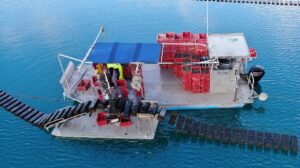
FlipFarm and vessel
A new session for this year, which looked at shellfish farming as a profession, kicked off with Jos van Damme, a retired mussel farmer, talking about how the industry had changed during his 50-year involvement. His talk was followed by a round table discussion, chaired by Nathalie Steins from Wageningen Marine Research (WMR), with young professionals working in shellfish farming, processing and hatcheries.
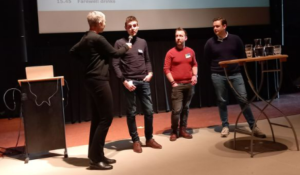
Young professionals’ round table with Nathalie Steins (moderator), Willem de Jonge (mussel farmer), Johan de Bat (Roem van Yerseke) and Adriaan Cornelisse (oyster farmer)
This discussion uncovered the need for a forum for young people working across the shellfish sector to enable them to share experiences and practices, discuss issues, collaborate on solutions and highlight opportunities.
Caroline Verwijs, Director of Krijn Verwijs Yerseke and a member of the organisation committee, was delighted with the outcome of this new session. She had taken inspiration partly from the “members’ slot” at the annual Shellfish Association of Great Britain conference and partly from observing young people working for her own company. She hopes that it will encourage greater understanding of the shellfish industry – and encourage more young people to look at the varied career options available.
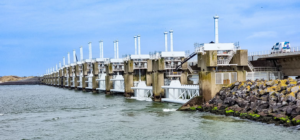
Storm surge barrier, Deltapark Neeltje Jans
Do mussels have feelings?
A pitch session enabled several companies to outline their latest projects and products, including Murre Technologies on the FlipFarm, which removes much of the backbreaking work for oyster farmers, and Paul Denekamp, who represents Molluscan Welfare on the AAC. Denekamp’s words were not entirely welcome, as he outlined his mission to have molluscs declared as sentient. However, there is currently very limited research available on this subject.
An accompanying busy trade fair was the biggest yet at the conference, with 32 companies taking stands to promote shellfish farming and processing equipment, hatchery oyster seed, shipbuilding, quality assurance, insurance, futuristic offshore technology, finance, education and training.
Space was also given over to researchers for poster presentations, included research into offshore mussel and seaweed cultivation in the North Sea, which sparked much discussion.
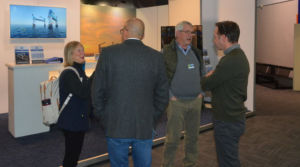
Nicki (left) and John Holmyard (second from right) of Offshore Shellfish
Martin Scholten, a former director of WMR, ended the conference by taking a look at the requirements for a future-proof shellfish industry and drew together the issues from the day. He explained that many dilemmas remain to be resolved, from regulation to scientific understanding.
In the past, the sector has had to respond to threats such as water quality and seed failures, but there are now more opportunities to be seized. This requires cooperation, vision and strategy – but history has shown that this is possible.
The conference was hailed as a triumph for the four main organisers – Jaap Holstein, Jasper van Houcke, Jacob Capelle and Aad Smaal – who hope to repeat the event in two years’ time.

